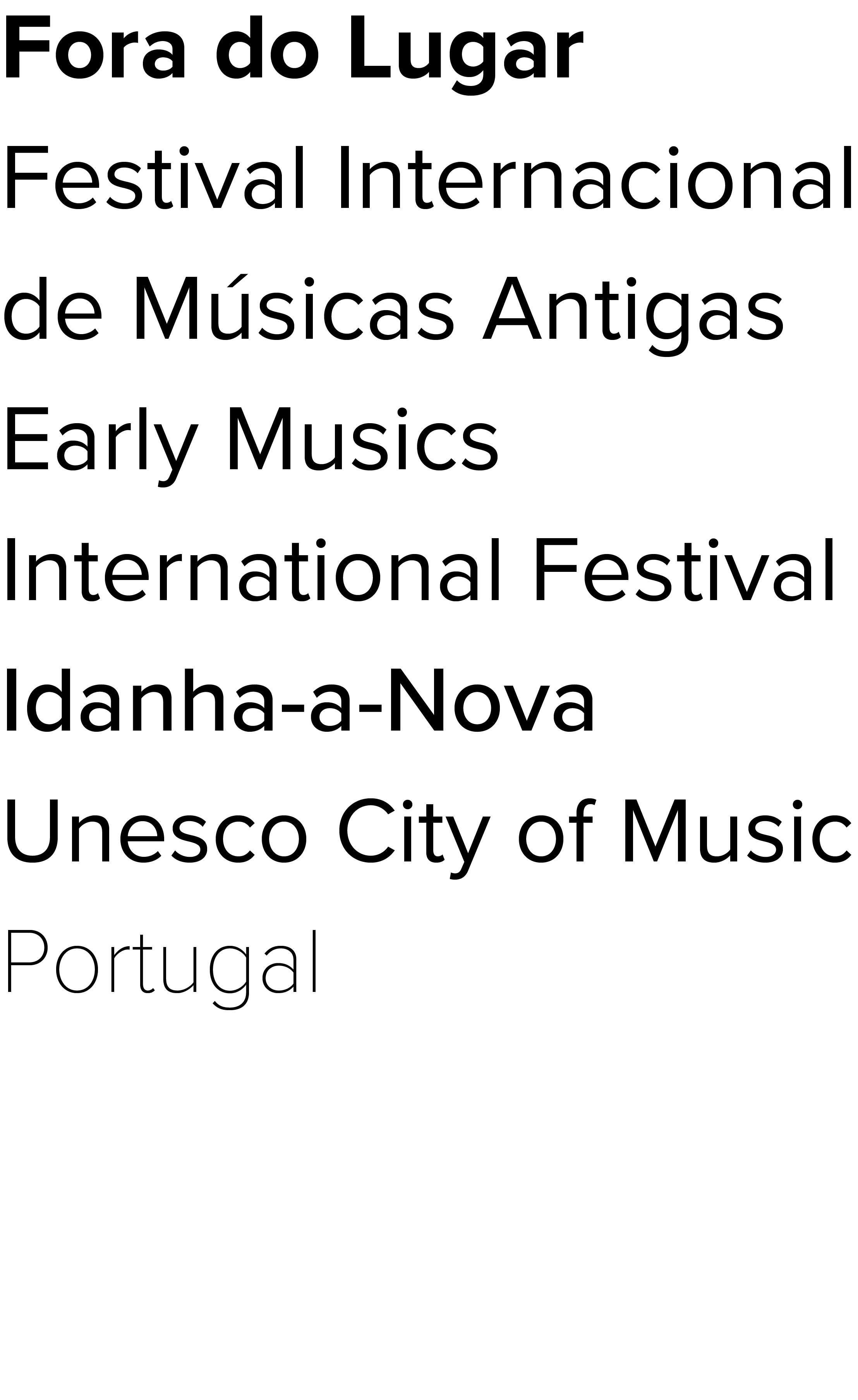Fotografia Photo: Gianfilippo Masserano
Concerto Concert
Sexta-feira Friday
29.11.2023
20.00
Duò
Lavoà Lapò
França
France
Idanha-a-Nova
Centro Cultural Raiano
Damien Toumi
voz voice, bendir
Manu Théron
voz voice, bendir
Estirador
La Vau dau Cap Mond
Lei Transformaciens
Lei nombres
Mamma
Polkamploà
Adieu
Romance de Don Gaiferos
Lo Rat
Lo Rossinhòl
Lo Polit mes de Mait
Notas ao programa
O percurso de Damien Toumi e Manu Théron já os tinha tornado cúmplices e complementares muito antes de se terem conhecido. O ressurgimento da língua de oc, o seu amor pela vocalidade popular e a reconstrução de um imaginário mutilado – desenvolvido numa realidade muito pouco formal – uniu-os neste novo projecto musical.
Algumas das canções provêm do cancioneiro Chants populaires de la Provence, outras de gravações de campo e de composições e invenções dos cantores. Celebram o renascimento, o despertar para a vida e as belezas do mundo. Celebram tudo o que pode ser incluído num estado privilegiado da alma, uma celebração da alteridade. Os ritmos de base são precisos, tendo em consideração o texto e a rudeza da vida, que se reflectem na história incrivelmente colorida, orgânica e popular do canto tradicional da Occitânia.
O Duò Lavoà Lapò é composto por Damien Toumi e Manu Théron, ambos percussionistas e cantores. O seu percurso, paixão e energia já os tinha tornado cúmplices e complementares muito antes de se terem conhecido. O ressurgimento da língua de oc, o seu amor pela vocalidade popular e a reconstrução de um imaginário mutilado – desenvolvido numa realidade muito pouco formal – uniu-os neste novo projecto musical que se apresenta hoje. Partindo de um repertório impossível de datar e espalhado pela Occitânia em cada canto da sua fantasia, construíram ideias e sons que duas vozes e duas percussões enunciam, incitam e revelam. As suas combinações precisas exploram as melodias tradicionais, extraindo delas a sua essência e restituindo-lhes todo o sabor da sua singularidade; os ciclos de percussão nos pandeiros, pacientemente polirrítmicos e elaborados, são iluminados por padrões inesperados, desconcertantes e profundos; a polifonia inspira-se nas apaixonantes harmonias do Mediterrâneo, imbuídas de um calor poderoso; «ESTIRADOR» significa «uma vida longa» e «prolongar o tempo do prazer».
Programme Notes
Some of the songs come from the ‘Chants populaires de la Provence’ songbook, but also from field recordings and compositions and inventions of both singers. They celebrate rebirth, awakening to life and the given beauties of the world. All this can be included in a privileged state of the soul, a celebration of otherness. The basic rhythms are accurate considering the text and the harshness of life, which endures in the incredibly colourful, organic and popular history of the traditional singing of the Occitania.
Duò Lavoà Lapò is made up of Damien Toumi and Manu Théron, both percussionists and singers. Their path, passion and energy made them complementary accomplices long before they actually met. The revival of Occitan, the love of popular vocality, the reconstitution of a mutilated imaginary – developed in its very unformal reality – are what led them to this new musical project today. Starting from an undatable repertoire which wanders through Occitania in every corner of their fantasy, they have built up ideas and sounds that two voices and two percussions can enunciate, arouse and reveal. Their precise combinations explore traditional melodies to extract their essence and restore them with all the flavour of their strangeness; the patiently polyrhythmic and elaborated frame percussion cycles are enlightened by unexpectedly disrupting and saturating patterns; polyphony borrows from the passionate harmonies of the Mediterranean, imbued with a powerful warmth; ‘ESTIRADOR’ means ‘having a long life’ as well as ‘extending the time of pleasure.
Sinopses Synopsis
La Vau dau Cap Mond
Debaixo de uma figueira, o poeta recolhe o sumo leitoso do fruto e inebria-se com ele no sopé das falésias. Emerge ligeiro da vertigem das alturas e celebra o esplendor das montanhas que o rodeiam. Sabe que terá de deixar uma canção para aqueles que virão depois dele.
Under a fig tree, the poet collects the milky juice of the fruit and gets drunk on it at the foot of the cliffs. He emerges light from the vertigo of the heights and celebrates the splendour of the reliefs which surround him. He knows that he will have to leave a song for those who come after him.
Lei Transformaciens
Farândola provençal originária da região de Forcalquier que conta a história de uma jovem que tenta escapar a um pretendente mudando de forma, género ou espécie. O pretendente adapta-se, transformando-se para se tornar no seu par ideal. Se ela se transforma em endiva, ele torna-se orvalho; se ela se transforma em rosa, ele transforma-se em abelha; se ele se torna uma abelha, ela torna-se uma estela; se ela se torna estela, ele torna-se aurora, etc.
Provençal farandole originating from the Forcalquier region, where a young woman tries to escape a suitor by changing shape, genus or species at will. The suitor adapts by also changing to find an ideal match. She is an endive, he becomes dew; she is a rose, he becomes a bee; he becomes a bee, she becomes a star; she becomes a star, he becomes dawn, etc.
Lei nombres
Um canto que enumera um imaginário específico do simbolismo cristão relacionado com os números, sincretizando, sem dúvida, elementos pagãos e do cristianismo primitivo. Alguns são para nós um absoluto mistério, outros são mais convencionais.
A counting song enumerating a particular imagery of numbers from Christian symbolism, certainly syncretising pagan elements and others from very early Christianity. Some are absolutely mysterious to us today, others more conventional.
Mamma
Um canto siciliano agora considerado da região de Arles, na Provença, no qual uma jovem rapariga exige à mãe os recursos e a autorização para sair e dançar. Perante a recusa da mãe, a rapariga desafia a proibição e promete a si própria que irá conhecer jovens galantes tão intrépidos quanto ela.
Sicilian Chant relocated to Arles, Provence, where a young girl demands from her mother the means and permission to go out and dance. Faced with the latter's refusal, she defies the ban and promises herself to meet young gallants as intrepid as she is.
Polkamploà
O jogo das organizações do fundo de desemprego é fazer com que os desempregados dancem as figuras mais complexas, e extrair-lhes as expressões mais dolorosas para fazê-los desejar um hipotético direito ao trabalho... ao contrário do tempo em que os trabalhadores se uniam na luta. Mas esse momento chegará de novo e serão os patrões a dançar desesperados até à exaustão!
The big game of the unemployment management organisations is to make the latter dance the most complex figures, and to extract the most painful grimaces from them to make them glimpse a hypothetical right to work... Unlike the time when workers were united in struggles. But that time will come again and the bosses will dance in turn and grimace until exhaustion!
Adieu
A Occitânia passou de área cultural para região administrativa. Com esta alteração, perdeu dois terços do seu território. Esta canção recorda ao povo desta cultura as suas lutas e o trabalho que resultou na unidade e no reconhecimento da sua singularidade, numa celebração das diferenças e das semelhanças, do amor de uma humanidade em harmonia com a natureza, e das inspirações e esperanças que a rodeiam ou constituem.
Occitania, from a cultural area, has become an administrative region. In this change it lost two thirds of its territory. This song reminds the people of this culture of the struggles and work that led to unity and recognition of their singularity, in a celebration of differences and similarities, and in the love of a humanity in harmony with nature, the inspirations and hopes that surround or constitute it.
Romance de Don Gaiferos
A história pouco conhecida de Guilherme X da Aquitânia que, para expiar os seus pecados, empreendeu uma peregrinação a Santiago de Compostela. Nesta canção, Guilherme encontra um trovador que canta louvores à Virgem de Bonneval. Ambos chegam à Catedral de Santiago e o bispo abençoa Guilherme, que morre e é sepultado aos pés do altar.
The little-known story of Duke William X of Aquitaine, who atoned for the barbarity of his crimes by setting off on the paths of Santiago de Compostela. There he meets a troubadour, one who sings the praises of the Virgin of Bonneval. Both of them reach the Cathedral of Santiago, and the bishop blesses William, who dies and is buried at the foot of the altar.
Lo Rat
Um camponês é avisado por um amigo que a sua mulher está a aproveitar os períodos que passa no campo para se entregar à devassidão na companhia do padre. Regressando inesperadamente a casa, o camponês surpreende a sua mulher, que diz ao padre para se esconder na palha. O camponês malha na palha com tanta força que o padre acaba por aparecer, dizendo-lhe que veio confessar a amante, que está demasiado grávida para ir à igreja.
A peasant is warned by one of his friends that his wife is taking advantage of his periods of expeditions to the fields to indulge in debauchery in the company of the priest. When he returns home unexpectedly, the peasant surprises his wife, who has just sent the priest to hide in the hay. The peasant hammers the straw so hard that the priest emerges, claiming to have come to confess the mistress, who is too pregnant to go to church.
Lo Rossinhòl
Um jovem apanha uma violeta, que entrega ao rouxinol selvagem como mensagem para a sua amada. Este leva-lhe a flor e a donzela adorna-se com ela para honrar o seu pretendente, o qual elogia a graça e a nobreza daquela que se tornou sua noiva.
A young man picks a sprig of violet, which he gives as a message for his beloved to the wild nightingale. The latter transmits the flower with which the beauty adorns herself to honour the gallant. The latter is full of praise for the grace and nobility of the one who has thus become his fiancée.
Lo Polit mes de Mai
Um jovem planta um espinheiro para a sua amada, que acaba por ser cortejada por um guarda. O jovem fica ofendido e afasta-se, enraivecido. Quando regressa, pede à vizinha notícias da sua amada, que casou com um homem mais rico e não com este mau cantor!
A young man plants a May tree for his sweetheart, who ends up being courted by a guard. The young man takes offense and runs away in anger. On his return he asks his neighbour for news of the beauty, who has married a richer man and not this bad singer!



